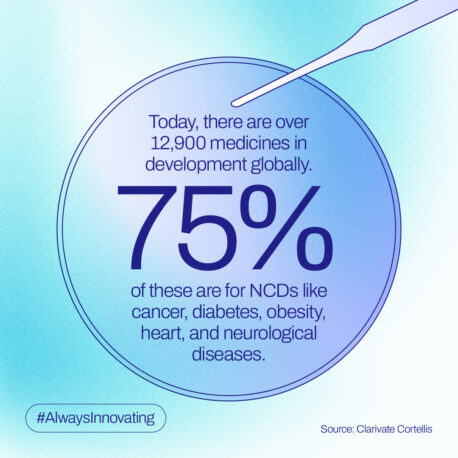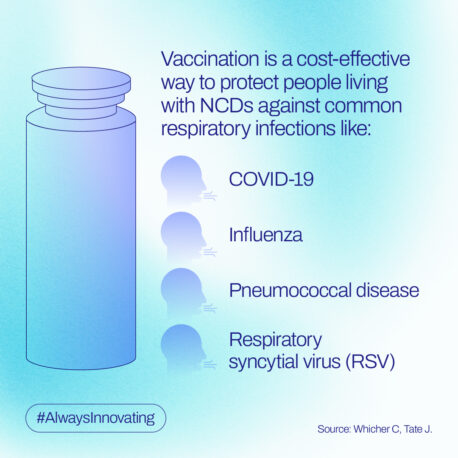Non-communicable diseases


IFPMA helps tackle non-communicable diseases (NCDs) by building multi-sectoral alliances and reinforcing the importance of investing in NCD prevention and care through our policy, advocacy, and communications work.
Overview
NCDs, like cancer, cardio-renal-metabolic diseases, and neurological conditions, pose a critical and growing challenge to people, communities, and economies around the world.
Each year, over 43 million people die from an NCD or mental health condition. Eighteen million of these are before the age of 70, and 82% of these premature deaths take place in low- and middle-income countries.
The Sustainable Development Goal (SDG) on Good Health and Well-Being targets a one-third reduction in premature NCD deaths by 2030 (SDG 3.4), but only 19 countries are on track to achieve this target.
Addressing the global burden of these diseases can only be achieved through continued innovation, sufficient and sustainable investments in strengthening primary health care systems, implementation of cost-effective interventions, and greater accountability across all stakeholders.
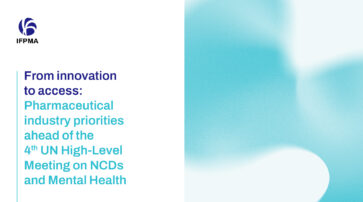
From innovation to access: Pharmaceutical industry priorities ahead of the 4th UN High-Level Meeting on NCDs and Mental Health
Non-communicable diseases (NCDs), such as diabetes, cardiovascular, renal and metabolic diseases, cancer, chronic respiratory diseases, mental health and neurological diseases, are one of the greatest global health and economic threats we face in our lifetime. Since 2000, global deaths due to NCDs have increased rapidly, even as deaths due to communicable diseases have declined. The...
Read moremedicines for NCDs launched in the past decade
new medicines in the pipeline for NCDs and mental health
An additional 1% increase in GDP dedicated to health spend, where 40% goes to primary NCD interventions, could save an additional 5 million lives every year
Reducing premature mortality
Enabling people to live longer, healthier, and more productive lives is fundamental to global health progress and economic growth.
Medicines and vaccines have already transformed the prevention, treatment, and control of NCDs and mental health around the world – and the next generation of medical developments will take us even further. But we know these innovations are meaningful only if they reach the people who need them.
Through partnerships and collaborations, we drive different activities in LMICs that contribute toward a shared goal of reducing NCD deaths globally.
This spans needs assessments, capacity building, promoting health literacy, fostering patient empowerment, strengthening health systems, and working on pricing and affordability solutions to make medicines more accessible to the global population.
NCD prevention and treatment is also a strategic investment. Today, the cost of inaction is USD $2 trillion. However, investing in the prevention, treatment, and control of NCDs would yield a 7-fold annual return in LMICs, leading to USD $230 billion in economic gain by 2030.
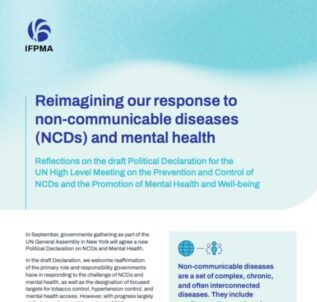
Reimagining our response to non-communicable diseases (NCDs) and mental health
Reflections on the draft Political Declaration for the UN High Level Meeting on the Prevention and Control of NCDs and the Promotion of Mental Health and Well-being This advocacy brief outlines three areas where industry seeks more explicit commitments from governments: Leverage health innovation Strengthen prevention and early action for lifelong health Address multimorbidity through...
Read more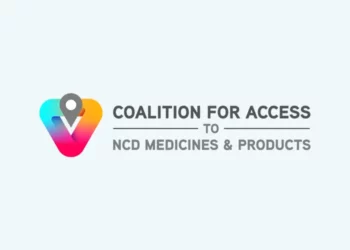
Coalition for Access to NCD Medicines and Products
This global, multisectoral coalition is dedicated to increasing access to medicines and health products for NCDs.
Read more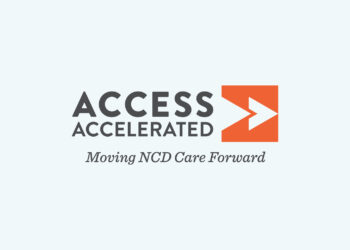
Access Accelerated
Access Accelerated is driving unprecedented collaboration to advance global progress on NCDs for those who need it most.
Read more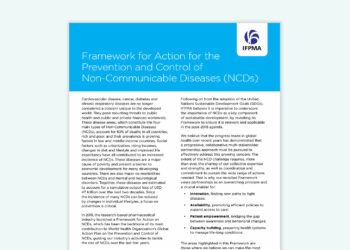
Framework for action on NCDs
Launched in 2011 and revised in 2015, the Framework for Action on NCDs recognizes the contribution of the innovative pharmaceutical industry toward preventing and controlling NCDs.
Read more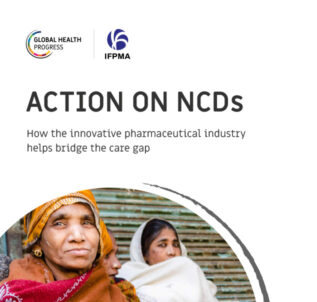
Action on NCDs: How the innovative pharmaceutical industry helps bridge the care gap
In the spirit of the Global Week for Action on NCDs, this report reiterates the long-standing commitment of the innovative pharmaceutical industry to bring innovative solutions, bridge the NCDs care gap, and accelerate Universal Health Coverage (UHC) and the 2030 Sustainable Development Goals (SDGs).
Read moreNCDs and vaccines
Vaccines protect people living with or at risk of NCDs.
For instance, HPV vaccines and Hepatitis B vaccines could prevent over 1 million cancer cases worldwide every year, including cervical cancer and liver cancers.
Vaccines also prevent infectious diseases like influenza, pneumococcal diseases, and RSV, which can worsen chronic conditions, trigger complications, or can lead to hospitalizations or death. Immunizing people living with NCDs can protect people’s health and reduce health system straining, both in the short term during seasonal infection peaks and over the longer term as populations age.
Vaccines are also a cost-effective intervention. An analysis across 10 high- and middle-income countries shows that comprehensive adult immunization prgrams can yield up to a 19 times return on investment for society.
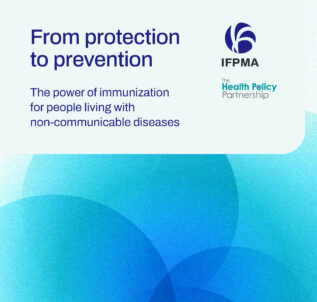
From protection to prevention: The power of immunization for people living with non-communicable diseases
The policy report From protection to prevention: The power of immunization for people living with non-communicable diseases has been commissioned to The Health Policy Partnership (HPP) by IFPMA.
Read more#AlwaysInnovating for NCDs and mental health
Cardio-renal-metabolic diseases
The innovative pharmaceutical industry is constantly developing new ways of addressing comorbidities linked to cardio-renal-metabolic (CVRM) diseases. These include cardiovascular disease, diabetes, chronic kidney disease, stroke, non-fatty liver disease, and obesity.
Over the years, scientists have discovered more about the interplay of various genetic, environmental, and lifestyle factors affecting CVRM. This knowledge has allowed the innovative pharmaceutical industry to develop a range of effective treatments, include GLP receptor agonists, while ensuring access to existing treatments like antihypertensives, statins, and insulin.
Despite this remarkable progress, CVRM accounts for almost half of all NCD deaths. These interconnected conditions are frequently underdiagnosed and undertreated, and their economic burden is projected to reach approximately USD $28 trillion by 2030.
In LMICs, IFPMA supports more integrated care and multipronged action plans to prevent, diagnose, manage, and care for CVRM. We aspire to transform the CVRM disease landscape by building health system capacity for improved early intervention and secondary prevention.
According to the WHO:
CVD is the leading causeof death worldwide
people are obese worldwide
Approximately 800 million people live with chronic kidney disease, meaning it will become the fifth leading cause of life years lost by 2040
Diabetes
In the 100 years since insulin was discovered, the innovative pharmaceutical industry has helped pioneer new treatments, delivery mechanisms, and blood glucose monitoring devices.
These have reduced side effects and long-term complications and improved quality of life for people living with the condition.
IFPMA and our member companies also work with a range of stakeholders to ensure that people all over the world have access to the set of health products required for managing diabetes.
We collaborate with governments, civil society, heath providers, and private stakeholders to scale up successful existing diabetes initiatives and explore new collaborative models. In this regard, we are supporting multi-stakeholder efforts to create a healthy markets framework for insulin and to expand access to quality care for people living with diabetes in LMICs.
IFPMA is committed to the WHO Global Diabetes Compact, launched in April 2021.The Compact unites key players across all public and private sectors, including people living with diabetes, to shape a common agenda and drive action toward improved solutions for diabetes treatment and care in LMICs.
million adults (20-79 years)live with diabetes
Diabetes caused at least USD $1 trillion dollars in health expenditure in 2025
diabetes medicines are currently in development
Diabetes CarePak
IFPMA supports Diabetes CarePak to improve access to safe insulin administration and self-care in Kenya.
Diabetes CarePak is expanding to other African countries such as Tanzania, Mali, and Mozambique. By bundling elements of treatment and care for people living with diabetes, CarePak improves affordability and accessibility for better diabetes control.
Cancer
Around 4,724 cancer medicines are currently being developed through the innovative pharmaceutical industry’s continued R&D.
deaths in 2020 were due to cancer, with 70% in LMICs
children and adolescents of 0-19 years old develop cancer
cancer medicines are currently in development
Managing cancer globally for the future
In the past 50 years, understanding of cancer has advanced considerably, leading to new and more effective treatments.
The innovative pharmaceutical industry is dedicated to improving global cancer management based on more effective partnerships and collaborative approaches to providing access to healthcare.
In collaboration with other stakeholders, the industry is
- Enabling innovation, including through AI and precision medicine
- Supporting holistic approaches to cancer control that encompass health promotion, prevention, screening, early detection, accurate and timely diagnosis, and quality treatment and follow-up
- Collaborating on new and innovative financing models for cancer care
- Improving care delivery, including through integrated care.
Multisectoral partnerships
The pharmaceutical industry engages in multi-stakeholder partnerships to improve access to innovation for cancer control in LMICs.
These include:
IFPMA is an active member of the Access to Oncology Medicines (ATOM) Coalition. ATOM is an innovative global partnership launched by the Union for International Cancer Control (UICC) and other partners to address issues of access to essential cancer medicines, specifically in LMICs.
City Cancer Challenge (C/Can) leads a city-based partnership initiative that supports cities around the world as they work to improve access to quality, equitable cancer care.
Led by the WHO and in partnership with City Cancer Challenge, this global effort aims to reduce breast cancer mortality incidences and save approximately 2.5 million lives.
Launched in 2018 by the WHO, this initiative brings together various stakeholders who aim to increase childhood cancer survival rates by 60% by 2030.
IQN Path is an international multi-stakeholder expert group focused on improving quality of clinical biomarker testing.
UN High-level Meeting on NCDs and Mental Health
This September 2025 at the UN High-level Meeting on NCDs and Mental Health, governments will set a new vision to address the global burden of these diseases. The innovative pharmaceutical industry is committed to regaining the momentum we need for action on NCDs.



